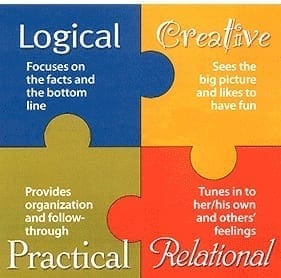 So what is the difference between right-brain and left-brain thinking?
So what is the difference between right-brain and left-brain thinking?
When I was about to marry my first husband, we were given a Myers-Briggs personality test about left/right brain thinking by the priest who was to marry us to predict our compatibility.
I do not recall what the results were, but I seem to remember a look of disappointment. (or maybe fear?) on the face of that priest. Since I have already said that he was my first husband, you can guess how things worked out.
Now, I am not saying that a standardized test or left/right brain thinking differences can predict the success or failure of your marriage or even how a couple will work through a divorce together, but stick with me.
I recently attended an all-day workshop geared toward collaborative divorce professionals that centered upon a whole brain theory.
Right/Left Brain Thinking Theory
We have all heard about right/left brain thinking, but this theory is that there are four quadrants of the brain and that each of us has a personality that (mainly) falls into one of them. Each quadrant essentially has its own style of thinking about things or approaching a problem.
The upshot of the workshop was that if you can understand that we all come from different viewpoints, we can communicate (or help others communicate) in a more effective way.
Related Post: How To Organize Your Legal Documents – Step By Step Guide
Logical Vs. Creative Thinker
For instance, a Logical thinker may walk into my office with a stack of papers full of facts and figures and a Creative thinker may have many ideas about a long-term approach and not be concerned with the paperwork at all. Each of my clients has approached his or her divorce in a different way.
Some are organized, and some are scattered, some want to argue, and some just want peace, while some are long-term thinkers and some are concerned about today and next week.
This is actually good news because, in a collaborative setting, different viewpoints and strategies are not only welcome but are essential.
The bottom line takeaway from this workshop for me is that divorce professionals can always learn more and add to the toolbox of strategies to help our clients reach agreements that will work for them now and in the future.
Disclaimer: The information provided in this article does not, and is not intended to, constitute legal advice and is for general informational purposes only.
Let Us Know How We Can Help!
Please fill in your contact information and a brief message about what you need help with. A consultation will need to be scheduled in order to provide legal guidance.
Joan Reed Wilson Esq. – Managing Partner
Practices in the areas of estate planning, elder law, Medicaid planning, conservatorships, probate and trust administration, and real estate. Admitted to practice in the States of Connecticut and California, she is the former President of the CT Chapter of the National Academy of Elder Law Attorneys (NAELA), an active member of the Elder Law Section of the Connecticut Bar Association, accredited with the PLAN of CT for Pooled Trusts, with the Veteran’s Administration to assist clients with obtaining Aid & Attendance benefits for long-term care needs and with the Agency on Aging’s CareLink Network.







